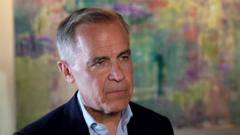**Recent polls reveal rising separatist sentiments in Alberta, driven by perceived neglect from the federal government and a cultural affinity with the United States.**
**Alberta's Separatist Sentiment: Exploring Independence and Ties to the U.S.**

**Alberta's Separatist Sentiment: Exploring Independence and Ties to the U.S.**
**Western Canadians increasingly voice support for Alberta independence and a connection to the U.S. amid political frustration.**
The political landscape in Alberta is shifting as conversations around independence gain traction among residents. Frustration with the federal Liberal government has propelled discussions about Alberta's future and its relationship with the rest of Canada and the United States.
In a small event hall in Lethbridge, Dennis Modry, co-leader of the grassroots Alberta Prosperity Project, surveyed about 100 attendees on their opinions regarding Alberta's autonomy. While some advocated for a greater role within Canada, a significant portion expressed support for independence, with others suggesting that Alberta should consider joining the U.S.
Modry, a retired heart surgeon, emphasized that the movement for sovereignty is growing, influenced by comments from U.S. President Donald Trump about Canada potentially becoming the 51st state. Despite the president's remarks, Modry remains focused on achieving Alberta's sovereignty rather than outright annexation.
Co-founder Jeffrey Rath, also a lawyer and rancher, sees merit in the idea of Alberta aligning with the U.S., highlighting cultural similarities with neighboring states such as Montana and Texas. "We have a lot more in common with America than anywhere else," he stated, reflecting a sentiment echoed by some locals integral to the separatist movement.
Previously considered fringe, the discussion of Alberta's unity crisis is now mainstream, with political figures like Preston Manning voicing concern over the Liberal government's impact on the western provinces. Manning warned that continued mismanagement could push many Albertans towards a desire for secession.
Western alienation remains a longstanding grievance among Alberta and Saskatchewan residents who feel overlooked by the national government. Tensions peaked during former Prime Minister Justin Trudeau's tenure, which saw policies perceived as detrimental to Alberta's oil and gas industry.
Despite potential support for a referendum on independence, recent polls indicate that only a quarter of Albertans might vote to leave Canada. Despite skepticism about a legitimate separation movement, many Canadians believe the matter should be addressed seriously, as suggested by separate surveys.
Political commentators surmise that the next Canadian prime minister will face significant challenges reconciling the East-West divide. Alberta Premier Danielle Smith has taken a unilateral stance in discussions with the U.S. regarding trade, a move that could deepen rifts with the federal government. Amid ongoing tensions, she warned of a potential "national unity crisis" should Alberta's demands for resource policy changes go unaddressed.
Within the separatist factions, opinions diverge, with some advocating for improved negotiations with Ottawa rather than outright independence. Lorna Guitton, a volunteer for the Alberta Prosperity Project, expressed a desire for a better deal within Canada while rejecting the idea of joining the U.S. "I would rather be my own independent province," she stated.
Rath, surveying his ranch, posited that Alberta's alignment with American values of entrepreneurship and limited government could foster greater collaboration. He is currently organizing a "fact-finding" mission to present Alberta's interests directly to Washington.
While some Albertans resonate with separative rhetoric, many remain skeptical and advocate for unity. Local resident Steve Lachlan suggested that rather than separation, the province should seek togetherness. Changing demographics in urban areas also hint at a moderating influence on Alberta's political alignment, with polls suggesting increased Liberal representation in the upcoming elections.
As political dynamics continue to evolve in Alberta, the conversation around independence, unity, and alignment with the U.S. will likely remain a critical issue in the province's discourse.





















